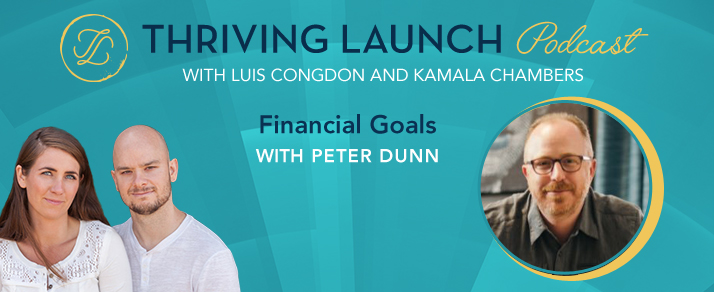Financial Goals – Peter Dunn

SUMMARY
On this episode, we’re going to talk about setting our financial goals and how to attain them.
We’re here with Peter Dunn, also known as Pete the Planner, a USA Today columnist, and the host of Pete the Planner Show and Million Dollar Plan podcast. He’s going to give us the equation to figure out if we are financially successful.
KEY TAKEAWAYS
![]() Have as few financial obligations as possible.
Have as few financial obligations as possible.
![]() Income, assets, debts, and mood are all terrible ways to measure your financial life.
Income, assets, debts, and mood are all terrible ways to measure your financial life.
![]() The best way to measure your financial life is using the ‘Power Percentage.’
The best way to measure your financial life is using the ‘Power Percentage.’
![]() Power Percentage equation: add all of your financial activities up, then divide the total amount by your gross monthly income
Power Percentage equation: add all of your financial activities up, then divide the total amount by your gross monthly income
![]() Power Percentage Scale:
Power Percentage Scale:
- <10% – You’re in trouble
- 11% – 20% – You’re doing okay
- 21% – 34% – You’re doing good
- >35 – You master your financial life.
![]() The goal in life financially is to make your Power Percentage go up by at least 1% a year.
The goal in life financially is to make your Power Percentage go up by at least 1% a year.
TRANSCRIPTION: FINANCIAL GOALS – PETER DUNN

Luis Congdon
Hey there, Thriving Launchers. Today, we’re going to talk about a subject we all need to be discussing more often, and that is money and financial goals. Also, how do you measure financial success and what’s the right way of answering that?
Today’s guest blows us away by giving as an answer I’ve never heard before and one that has completely changed my outlook on how I’m determining my financial goals and measuring my financial wealth and success. Make sure to tune into that today.

Kamala Chambers
Today, we are here with Peter Dunn, also known as Pete the Planner, who is an award-winning comedian and award-winning financial mind. He is a USA Today columnist, the author of ten books, and he has a popular radio show the Pete the Planner Show, and a podcast Million Dollar Plan.
Pete has appeared regularly on CNN, Fox News, Fox Business, Good Morning America, and numerous other radio programs. He is commonly considered one of the four most experts on financial wellness in the world.

Luis Congdon
All right. Thriving Launchers, I’m excited. Right now, we have Pete the Planner. We’re ready to talk about financial goals and money.
Pete, are you ready to launch?

Peter Dunn
Absolutely. I haven’t launched in quite some time so today is as good day as any.

Luis Congdon
Let’s do it.
Just before the interview, we were chatting. Kamala and all of us we’re talking. One of the things that have been on my mind, so I find it very serendipities that it’s something you said, “Hey, I want to talk about this today.”
One of the things I’ve been thinking about a lot is how do I determine my financial goals and how do I measure financial success? What does that even mean? It changes. It changed for me when I was broken and homeless. Financial goals and success meant I have enough money to put some money in my car, and fuel that thing.
Then, now, money is very different. It means “Hey. I need to have X amount of dollars and savings. I don’t go below that, and I’m able to diversify.”
But, from your perspective, what is the right answer or how do we even answer that accurately? How do we measure financial success? Or how do we know we’ve attained our financial goals?


Peter Dunn
I think there is metric which we’ll get to, but I think back to my early 20’s of how I viewed financial success, I did it two ways. Both are pretty gross.
- I wanted to make more money than my father made during his career.
A lot of people do those sorts of things. But Luis, I’ll tell you. It’s pretty disgusting to trivialize my father’s entire career down to my goal with to make more than him.

Kamala Chambers
We’re not judging you.

Peter Dunn
No. It’s gross. Believe me. It’s terrible.
Definition Of Financial Goals

Peter Dunn
Then, I get to this weird place where I was doing okay in my career, and said, “I want to make as much money as I can to be able to afford whatever I want.” That’s a standard definition of financial goals.
But then, I figured out, “That’s a wild goose chase.” That’s a lifestyle creep. You’ll never please yourself. You’ll make more, spend more, make more, and spend more. And so, I abandoned that definition of financial goals.
So here’s where I’m at currently to achieve my financial goals. I want to have as few financial obligations as possible. That doesn’t mean I’m cheap. It doesn’t mean I don’t buy stuff. It means I’m not going to commit my future income, to what will become my past.
If I have debt, then all of a sudden, I’ve got this lifestyle and these obligations I don’t want to deal.


Peter Dunn
That’s where I start this conversation on financial goals.

Kamala Chambers
I love that.
One thing I see a lot of people doing in the online space is there are all this different software we have to invest and all these different monthly fees. I’m always looking for “How can we cut down on the monthly fees?” Everything adds up like its $10 here, $300 there. All of that adds up, and it drains away from the life force of achieving our financial goals
What is one practical tip you’d share with us about this?
Questions On Financial Goals Are Risky

Peter Dunn
I think it goes to the idea if I were to approach you two on the street and say, “Hey. How’s your financial life going? What are your financial goals and how are you going to achieve them?”
First off, that’s a weird way to start a conversation with two people in the street.

Kamala Chambers
We might just turn and run because that’s a risky question. That’s a dangerous thing for people to talk about.

Peter Dunn
It is. I don’t care if it’s good or bad. I do care, but like, I’m not interested. Here’s what I’m interested.
How do you determine whether you’re going to say it’s good or bad? What do you measure your financial life and financial goals on? I find most people do it on four things.
Stress Level Affects Financial Life And Financial Goals

Peter Dunn
They’ll say, “Oh, it’s good,” but based on their mood or their current financial stress level.
Do you guys have a pet? If you have a pet, you have to go to the vet. You go to the vet, and the vet is touching your dog. You don’t know any parts of your dog. And they’re like, “Hey. This part is broken.” You’re like, “I guess you’re right. I don’t know.” And then, you get a bill for $480 in the lobby.
Then, you go home, and you see your friend. Your friend said, “How’s your financial life going?” And what do you think?

Luis Congdon
It’s not doing so well right now.

Peter Dunn
Exactly.
Way To Determine Financial Goals And Success

Peter Dunn
So, that’s the first way we are so fickle. Even if your financial life’s going great and you’ve attained some financial goals, if you get a little stressed, an unexpected bill, you would say it’s not doing well.
Let’s look on the flipped side. It’s that month in which you get three paychecks instead of two, or you get a tax refund check, and you’re like, “It’s great.” Is it great? Or you just have a little bit more money? That’s the first way that people measure.
The second way is the classic, debt.
“I owe $50,000 in student loans, so my financial life is terrible.” But is it terrible? Or, is it just the 50,000 bucks have been an investment you made in yourself? I don’t like that either for an answer.
And then, you get into income. I used to work with professional athletes a lot. That’s what I did as a financial advisor years ago.


Peter Dunn
I think you guys both know that.

Luis Congdon
Yeah.
When you said that, it makes me think of Shaquille O’Neal. He’s one of the athletes that’s considered unique, and that he’s taken his money and invested it very wisely. He went out and got a master’s degree. He has a master’s degree in business. And he has a diversified way of investing and making sure that his money has more longevity than just letting it sit in the bank and spending it.

Peter Dunn
Yeah, exactly, that’s professional. Professionals get a bad rap. Some cliché say they do wrong things with their money. But, to some degree, that reputation has been earned by at least, the work I have done within that space.

Peter Dunn
And the fourth way, people say, “How are you doing financially?” How they answered is based on assets; how much money they have in the bank.
Here’s what I would think about that.
Let’s say it’s a Tuesday, and you just found out your favorite old uncle died. He died. You’re going to miss him. You’re his only heir. He leaves you 25,000 bucks. I see you tomorrow, and you’ve gotten over the sadness. You mourned very quickly, maybe too quickly.
Financial Goals And Assets

Luis Congdon
Oh, man.

Peter Dunn
Then, I say, “How you’re doing?” And you say, “You know what? My financial life is not bad.”
The only thing you did is you breathe longer than that guy. You didn’t do anything to achieve your financial goals. You just had an asset. You had 25,000 bucks.
Setting Financial Goals The Wrong Way

Peter Dunn
I think all of those ways to measure how you’re doing financially and set your financial goals are wrong ways.
Income, assets, debts, and mood are all terrible ways to measure your financial life because they all have their faults.

Luis Congdon
What’s that magical way of looking at that?
This is a significant mindset shift even for me as I’m listening. I know in my journey currently, and where I’m at, I look at assets, income, and how much money I have to determine if I have achieved my financial goals.
I look at the things that I own that are precious, the money that I have in the bank saved in case something happens or I want to buy something. It’s that sense of comfort that, “Hey. If I have that $400 bill, I’m okay. I’ll take care of it, and I’ve still got more money.” And, I have a work life and income that will quickly replenish that money that I just spent.
And so, from my perspective, when you said all these four ways, I went, “Yeah. Those are the four ways that I would answer it.”
So, what is the other way of answering on attaining your financial goals?

Peter Dunn
I’m going to begin to respond to this with quizzing you based on an email I received from one of my USA Today column readers. I have a column in USA Today. I get a lot of emails, and one of my readers sent me this question. You’re going to have to answer this. I’m off the hook here. It’s on you.
Retirement And Financial Goals

Peter Dunn
She and her husband are 55 years old. Their household income is $400,000/year, and they’d earned for the last decade. She wants to retire early. She has $1.7 million dollars set aside.
How is she doing?

Luis Congdon
In my opinion, if she just has 1.7 million saved, I think she is not close to reaching her financial goals because she doesn’t have something that’s building income off of what she has.

Peter Dunn
Right.

Luis Congdon
That’s just my opinion. Her money isn’t working for her. If she doesn’t have something that allows her to continue still to make money while she’s not working or semi-passive, then, it would be tough for her to achieve her financial goals.

Peter Dunn
Yeah.
Here’s the issue. She got no debt, but she made $4 million in the last 120 months. $4 million in the past ten years, and she’s got 1.7 to show.
To me, it means she’s addicted to her lifestyle. But she can’t just say, “I’m going to retire and cut my spending by 80%.” No, you won’t. You’re lying.
Being Income Independence As Financial Goals

Peter Dunn
That’s where people get delusional with financial independence. We all know people used to talk about retirement and now, we’ve started calling that financial independence. I don’t even like that. I like income independence where you don’t need your work income.
It can be passive income. It can be the revenue generated from your investment. It can be a pension. I don’t care what it is, but that lady needs to work on getting her financial goals because her lifestyle is crazy.
Equation To Determine If You’ve Reached Your Financial Goals

Peter Dunn
That is why the best way to identify if you’ve reached your financial goals is using Power Percentage.
Here’s the good news. I have nothing to sell anyone right now, so I’m just going to tell you how it works.
So what we do is take your gross monthly income. That’s before taxes, before benefits, and all those sorts of things. Let’s say you make $60,000 a year. It’s five grand. Write that number off to the side. This could be mathematics. I hope everyone paid attention in middle school.
Then, in another column, you’re going to write the following things. The amount of money you contribute to a retirement count on a monthly base, the sum of money that your employer contributes to a retirement account for you on monthly bases.
You can include any money you put into savings that won’t be immediately spent on a vacation or holidays, or something like that and any amount of your mortgage that goes to pay down principle in that month.
So I have a rental property, and I have our regular home. Each of those properties has an amount of principle that’s repaid every month. I want to write down those principles amount on this list.
Any debt you pay off on a monthly basis or pay towards on a monthly basis that is not transportation and is not a credit card that you used in that month. You can include student loans and medical bills. You write those things down. If you add all those things down and you divide by your gross monthly income, the percentage tells you how efficient you are with your income.
Analyzing Financial Goals Using The Power Percentage Scale

Peter Dunn
Here’s the scale because the scale matters.
If you’re below 10%, if less
Let’s say $5,000/month gross monthly income. Less than $500 a month is either paying off a debt or accumulating as an asset. That’s below 10%.
If you’re below 10%, you’re in big trouble. I don’t care how much money you have, how much money you make, how little debt you have, you’re in big trouble.
Between 11% and 20%, okay. 21% to 34% is good, and 35% and above is perfect.
One of the financial goals is to make your power percentage go up by at least 1% a year.
I like to be at 60% by the time I retire because that means I’m 60% efficient with my income, which means I’m income independent.

Kamala Chambers
Pete, what book would you recommend that you wrote that would go with this?

Peter Dunn
Your Money Life Series is my favorite because it’s broken down into decades. So if you’re in your 20’s, read Your Money Life: Your 20’s. If you’re in your 40’s, read Your Money Life: Your 40’s. And so, you’ve got one essentially for every decade.

Kamala Chambers
That’s fantastic.
What would you recommend as a tip that we can start to increase that Power Percentage to attain financial goals?
Increasing Power Percentage To Attain Financial Goals

Peter Dunn
There’s so much you can do. You can increase the amount you pay towards your mortgage, retirement deposit, or savings deposit. Pay down your student loans. Pay off your medical bills. Even invest in rental property. Do anything that either builds assets or pays down debt. This is a factor of net worth.
What you won’t do is buying stuff.
Buying stuff will not increase your power percentage but just about everything else will.
Accumulate Experiences Not Objects As Financial Goals

Kamala Chambers
There’s so little that we need. Luis and I, we travel the world a lot. I find that we can live off of everything in our backpack, and even then, we don’t even use everything we have with us.
I just keep learning how little we need to live a healthy and abundant life. I’m not saying people should live off out of their backpack.
I think that there are so many ways that we can cut down and find that high we get from shopping through something else that fills us up even more.

Peter Dunn
I agree. Sometimes, I look in my closet, or as I’m doing laundry, I’m like “Why the hell do I need all these shirts?” I have a washing machine. Why do I need this shirt? And it gets crazy. It’s like at what point do we stop accumulating stuff, and instead, to your point, collecting experiences that make you grow as a person.
Materialism is attractive. I’ve had an issue in relationship with overtime, but at this stage in my life, I just don’t need anything. I like good wine, don’t get me wrong but I’d rather just travel the world and have experiences. That for me are financial goals.

Kamala Chambers
And drink good wine where they serve it even cheaper, right?

Peter Dunn
Exactly. That’s the key.

Kamala Chambers
Drink wine right from the vineyards.
So before we close out, is there any last gift you want to make sure the Thriving Launchers walk away with about ways to attain financial goals?

Peter Dunn
This is a little career advice or a little unsolicited career advice which is always bad career advice by the way.
Doing What You Love For A Living As A Financial Goal

Peter Dunn
If you have the pleasure of doing something you love for a living, you owe it to yourself to measure success a little bit differently.
Yes, money and financial stability are great. But so often, people won’t do what they love for a living because they’re not willing to accept the money that comes with that. To me, that’s silly because you’re on the wrong metric.
If we’re trying to live a fulfilling life and serve a community and do these sorts of things but you’re hung up on money, you will suffer throughout the rest of your career. It’s because you’re going to be unhappy, and you’re thinking that money is what’s going to make you happy.
If you’ve earned the right to do what you love for a living, then by all means, use that metric of satisfaction in your career as a way to measure your success.
If you don’t, you’ll be perpetually unhappy. You’ll think your career is great except that you don’t make much money, but you’re just looking at it wrong.
There’s my unsolicited career/money advice to end the show.

Luis Congdon
That is a beautiful mindset shift and a change Kamala, and I can back 100% and say, Thriving Launchers, do what you love. This is something Kamala and I are always preaching.
It’s been wonderful to have you here Pete because I know that I needed to have this conversation today.
We need to be able to discuss our financial goals, and as one of the things we’ve gone over on today’s show is, it would be incredibly uncomfortable if someone just met us and asked us how our financial life or whether we have achieved our financial goals or not.
But honestly, I think even if we’ve known somebody for a long time, that’s a discussion that most of us won’t ever have. It’s just having that conversation or thinking about it, and even just having it with yourself can be very transformative.
It’s been a real pleasure, wonderful to have you here Pete.
Thank you so much for joining today and coming on Thriving Launch.

Peter Dunn
It’s my pleasure. It’s a great time. Thanks for having me.


